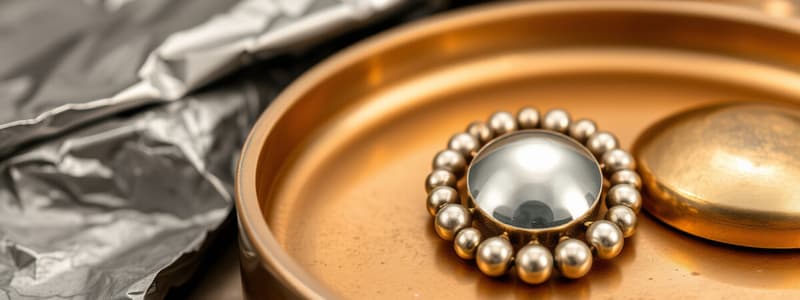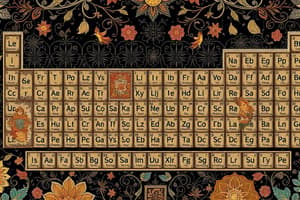Podcast
Questions and Answers
What metal is a bracelet made from?
What metal is a bracelet made from?
- Copper
- Gold (correct)
- Aluminium
- Stainless steel
What metal is used to make a frying pan?
What metal is used to make a frying pan?
Stainless steel
Copper can be pulled into thin wires and does not rust.
Copper can be pulled into thin wires and does not rust.
True (A)
A bridge is made of ______.
A bridge is made of ______.
What is the property of aluminium that makes it suitable for furniture?
What is the property of aluminium that makes it suitable for furniture?
What is an ore?
What is an ore?
What does the property of a material refer to?
What does the property of a material refer to?
Which of the following is a property of metals?
Which of the following is a property of metals?
Metals are generally soft and can easily break if dropped.
Metals are generally soft and can easily break if dropped.
What is ductility?
What is ductility?
What are two common problems with iron?
What are two common problems with iron?
What is gold used for?
What is gold used for?
How long has silver been used?
How long has silver been used?
Metals can be beaten or hammered into useful shapes; we say metals are _______.
Metals can be beaten or hammered into useful shapes; we say metals are _______.
Match the metals with their characteristics:
Match the metals with their characteristics:
Flashcards are hidden until you start studying
Study Notes
Overview of Metal Uses
- Metals are selected based on their properties for various everyday objects.
- Different metals serve distinct purposes due to their unique characteristics.
Jewelry
- Gold/Silver:
- Strong and shiny.
- Resistant to rust, making it ideal for bracelets and jewelry.
Cookware
- Stainless Steel:
- Used in frying pans.
- Notable for rust resistance and excellent heat conduction at high temperatures.
Electrical Conductors
- Copper:
- Known for its ability to be stretched into thin wires.
- Strong and highly conductive, with rust resistance.
Construction
- Iron:
- Hard and strong, suitable for building bridges.
- Prone to rust over time, necessitating protective coating (e.g., zinc plating).
Furniture
- Aluminium:
- Lightweight yet strong, ideal for furniture.
- Resistant to rust, ensuring longevity and durability.
Metals & Non-Metals
- Ore: A rock containing metals and minerals, important for extraction.
Properties of Metals
-
Malleable: Metals can be beaten or hammered into various shapes without breaking.
-
Ductile: Metals can be drawn into thin wires, making them suitable for electrical applications.
-
Rust: Iron forms a reddish-brown layer when exposed to air and moisture, leading to deterioration.
-
Conducts: Metals efficiently carry heat and electricity, essential for numerous applications.
-
Alloy: A combination of two or more metals or a metal mixed with a non-metal to enhance properties.
-
Plated: A technique where one metal is coated with another for improved durability or aesthetic appeal.
Everyday Uses of Metals
- Metals are incorporated into daily life items due to their beneficial characteristics:
- Strength: Metals do not easily break; they may bend under pressure.
- Hardness: Most metals are hard, though some, like pure gold, are softer.
- Shininess: Metals can appear shiny; scrubbing or scratching can enhance this property.
- High Melting Point: Allows for use in high-temperature applications, like boiling water in metal pots.
Common Metals and Characteristics
-
Iron:
- A widely used metal in tools, nails, and construction due to its strength.
- Prone to rusting when exposed to moisture and air.
-
Gold:
- Valued for jewellery-making due to its high malleability and resistance to tarnishing.
- Historically used by ancient civilizations like those in Mapungubwe.
-
Silver:
- A precious metal known for its brilliant shine.
- Has been utilized for around 8,000 years in various applications, including crafting and currency.
Studying That Suits You
Use AI to generate personalized quizzes and flashcards to suit your learning preferences.




